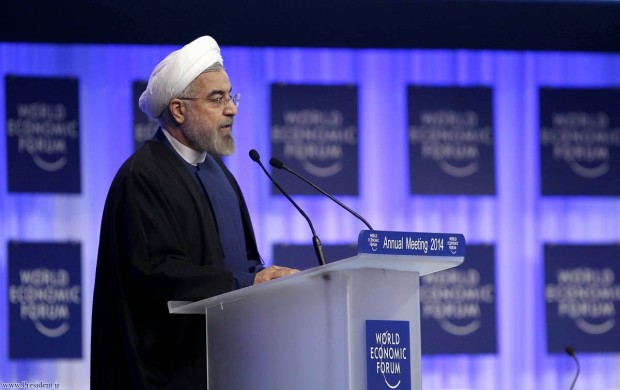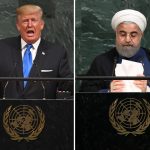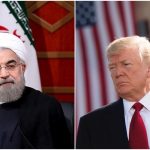by Djavad Salehi-Isfahani
Last week at the World Economic Forum in Davos, Switzerland, President Hassan Rouhani tried to persuade world business leaders to invest in Iran, especially in its hydrocarbon and automobile sectors.
His appeal is not likely to set off a gold rush; investors will wait to see if the nuclear agreement with the P5+1 is successfully concluded sometime this summer.
But broadening his call for engagement with the rest of the world beyond the nuclear deal indicates that his initiative is more than a charm offensive; it represents deeper social and economic change in Iran.
The implicit assumption behind the “charm offensive” discourse is that the Iranian leadership is only engaging in talks because it needs to gain some respite from sanctions to buy time to reach nuclear weapon capability. But luring foreign investors into Iran does not fit well with that strategy because any gains would only become apparent after the nuclear deal is concluded and would be reversed as soon as the deal falls apart and sanctions are once again implemented.
From Rouhani’s perspective, an open invitation to foreign investors risks expanding the ranks of his domestic foes beyond the growing opposition to the nuclear deal. Why add Islamists and leftists opposed to the penetration of Western culture and capital unless he really believes he can turn Iran into a hospitable place for outside investment?
Mark Landler of the New York Times played down Rouhani’s appeal by noting its “eerie echo” to a similar pitch by former Iranian president Mohammad Khatami in 2004, which was followed by Ahmadinejad’s ascendance a year later and a decade of hostility. Suggesting that Rouhani’s Davos promises might end similarly ignores several important differences between the two presidents and between the Iran of 2014 and that of 2004. Ignoring the obvious — in 2004 Khatami was on his way out while Rouhani is just starting his first term — there are at least two other distinctions.
Philosophically, Khatami and Rouhani share a moderate view of coexistence with the West, but when it comes to economic integration, they read from very different scripts.
Iran’s economy in 2014 bears little resemblance to that of a decade earlier. In 2004, thanks to a massive oil boom, Iran was bursting with economic optimism and feeling prosperous without foreign investment. Since the 1970s, except during the reconstruction period after the war with Iraq, Iran has not sought or depended on foreign investment for its economic growth.
Higher oil prices nearly tripled the oil revenues in Khatami’s last budget in 2004 compared to his first in 1998. Unemployment had been declining steadily, from 14.3% in 2000 to 10.3% in 2004, and inflation seemed low by today’s standards — averaging 14% per year instead of 35% in the last two years.
Today, after several years of harsh sanctions, Iran’s economy is in deep trouble and the government is broke. While inflation is coming down, unemployment is still above 14% (above 25% for youth). The $4.2 billion of funds that the US is releasing as part of the interim Geneva agreement adds only 5% to this year’s budget. It will not go very far in bringing public investment even close to its historical record of more than 15% of the GDP.
Public investment for the Iranian year starting this March is only $15 billion, which is 4% of the GDP. It is not even enough to pay for the repair of — much less build new — public infrastructure or assist the private sector. The government actually owes private contractors about $20 billion for work they have already performed on various public projects.
The private sector is also in a serious bind. In addition to unpaid government bills, the depressed economy has cut demand for its products, leaving many employers short of cash to even pay their workers. The auto industry, which was a focus of Rouhani’s appeal at Davos, is producing at less than half its capacity. The interim agreement restores the auto industry’s access to critical imports, but additional capital is what they need to create new jobs.
While financial necessity may be Rouhani’s reason for inviting foreign businesses to Iran, he also has reasons to be optimistic about the outcome of their engagement. First, he knows that more than three decades of revolutionary rhetoric and eight years of failed populist economic policies under President Mahmoud Ahmadinejad have tired out the general population and caused a major shift in the attitudes of Iran’s intellectual and technocratic classes. There is now a wider consensus in favor of private enterprise and engagement with the global economy than during the time of the Shah. This is why Rouhani has the most pro-business economic team in Iran’s history.
Second, in the last ten years, Iran’s workforce has become younger, better educated, and less expensive — all attractive features for foreign capital. The loss of value in Iran’s currency last year has brought labor costs in Iran below that of China. Were it not for their lower productivity, Iranian industrial workers would be able to outcompete East Asian workers. Foreign investment along with its superior technology and management is what Iran needs to raise its workers’ productivity.
The fate of global engagement for the Islamic Republic is not solely determined by these economic calculations. Many in the highest position of political power in Iran view rapprochement with the United States, which Rouhani considers a condition for meaningful global engagement, with deep suspicion. They fear that hostility toward the Islamic Republic runs deeper than the nuclear issue. They point to new sanctions legislation before the US Senate that requires Iran to make concessions unrelated to the nuclear dispute. A New York Times editorial did much to justify their fears by recommending that “Iran’s full reintegration into the international system” should depend on its “ending the hostility toward Israel.”
For Rouhani, after Davos, the path to global engagement remains uphill.






I think Rouhani’s wish to improve Iran’s economy by a great deal, is a good thing. But of course he will need a deal with the P5+1 to make it possible.
The last paragraph of the article says a lot about the motivation of Congress and those in the Administration that have felt compelled to adjust U.S. foreign policy to accommodate the demands of the Israeli leadership.
Yet, on its part, Israel has done little to acknowledge or address its outstanding debt to the Palestinians or its obligations under numerous U.N. Security Council resolutions. Instead, it has thumbed its nose at its neighbors, while continuing to seize and annex more and more of East Jerusalem- which has special meaning to all Muslims, including those in Iran- and the other Occupied Territories. At the same time, by insisting on its status as a Jewish, as opposed to Israeli, State it is seeking to legitimize preferential treatment for its Jewish citizens and discrimination against all of its other citizens. Finally, how can it expect a lasting peace- and how can the U.S. reasonably demand that Iran bless Israeli policy- when Israel continues to terrorize its neighbors, including Lebanon and Iran’s ally, Syria. (After all, did not Hezbollah come into existence as a result of Israel’s mad attempt to invade and occupy Lebanon.) So, if the Administration is expecting Iran to join its ‘community of nations’, it should also begin to restrain Israel and insist that it develop constructive policies to coexist and cooperate with its neighbors, and be willing to compete in the market place with Iran, instead of threatening its existence.
This means that U.S. foreign policy for the region also must change from that of a destabilizer, spoiler and plunderer to one that supports the type of constructive development in the region that can and will benefit all of peoples.
My sense is that the process will be slow, rocky and uncertain, but that in the end the economic benefits to our multinationals doing business with Iran- and their perception that those benefits are and will be substantial- will begin to shift U.S. policy in a more pragmatic direction. That assumes of course that Netanyahu and those more fanatic than he, will not start a conflagration before it can happen.
All things being what they are, I wonder as we go down the present road here, if Israel didn’t have such a strangle hold upon the U.S.Congress, that Israel had to be like every other country on the planet, would we be in the quagmire we are in today in the M.E.?
As for this post today, another academic writing his views, but qualifying it with the ever present charge of “Iran seeking to build a Nuclear bomb to blow up Israel”, without any proof that this is so. I can’t help but feel that this is an extension of the Israeli “remember the Holocaust” that the world has been inundated with all these years. Genocidal actions down through the ages have occurred, but we continually are bombarded with this one, and this country or that country is the bad guy and wants to eliminate the Jews or Israel. What is missing, is a sober take as to why such an action is considered in the first place. Perhaps because Israeli leaders/AIPAC/Israeli firsters P.R. campaign to demonize the various M.E. countries, it should be made to pay reparations for all the warmongers, stealing of lands, human rights violations, etc., which should be a fair trade off. I’m sure that the American donators can easily afford to pay such sums, considering they have just about all bases covered as far as financials are concerned.